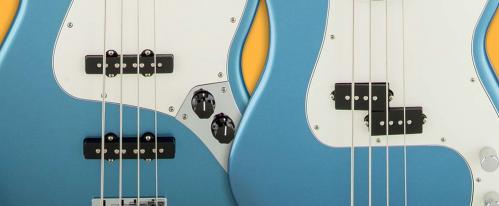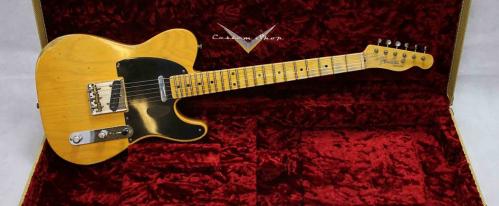WE EXPLAIN HOW THE CITES LAW WILL AFFECT GUITARISTS. COULD THIS MEAN GUITARS WITH ROSEWOOD MAY BECOME A THING OF THE PAST? UPDATE DECEMBER '19 - IT'S BASICALLY OVER!
If you’re a guitarist, there’s a really good chance one or many of your guitars has been built using rosewood. Whether on the body of an acoustic, or more than likely the fretboard; rosewood has long been used to create guitars thanks to its beautiful sound, resonance and comfortable, hardwearing properties which make it ideal for fretboards. Now, with the new CITES laws coming into effect, those guitars you own could potentially be the last ones using that wood.
WHAT IS THE CITES LAW?
CITES (the Convention on International Trade in Endangered Species of Wild Fauna and Flora) is an international agreement between governments designed to protect endangered plants and animals. The CITES law was introduced on the 2nd of January 2017 and put restrictions on how certain woods were traded across international borders – especially the likes of rosewood. Seeing as loads of guitars use rosewood for fretboards, the back and sides, and some guitars are entirely made of rosewood, everyone started freaking out a bit. Due to this restriction, the ordering of a guitar with rosewood became extremely difficult, as all of a sudden you needed CITES certification to trade rosewood guitars internationally.
Thousands of guitars and instruments using rosewood were suddenly stopped mid import and are still being held in ports all over the world due to the fact these guitars did not have the correct certification. Fortunately, guitars with rosewood could be traded within one country without certification. However, if brands wanted to ship them internationally each item had to have the CITES certification stating how the wood was sourced and where it came from. This was to try and stop the highly valuable rosewood being sold illegally and help to discourage deforestation.
Fortunately, almost all brands like Martin and Fender for example, are very responsible when it comes to sourcing tonewoods, however they, like every other brand will have to start applying for CITES certification for guitars imported into the E.U. after 4th Feb 2017.
WHAT DOES THIS MEAN FOR GUITAR COMPANIES?
The bad news, is that due to the heavy cost of applying for these CITES certificates for large batches of guitars, is that certain brands will potentially have to raise the prices of guitars to keep up with the cost of documentation. To combat this extra cost, brands may start to completely phase out rosewood altogether. The good news is that brands are looking to more sustainable tonewoods, making your guitar a far eco-friendlier investment. An added bonus is that your rosewood guitar could eventually become a collector’s item, too!
FENDER ARE ALREADY CHANGING THEIR TONEWOODS
In response to the crackdown on rosewood, Fender has announced that they will stop using rosewood and other regulated woods on all their Mexican-made and American Elite guitars and basses from July/August 2017. American Elite has now been discontinued - you can now shop the new and improved American Ultra Range.
MEXICAN FENDER MODELS USING PAU FERRO
The Mexican fender guitars will now use the Pau Ferro tonewood that is very similar to the likes of rosewood. It was even used on the Stevie Ray Vaughan signature Strat – so you know it’s good! Pau Ferro has been described as having a tonal quality firmly in the middle of Mahogany and Rosewood. It looks stunning thanks to rich caramel colours with black-purple lines and straight grain and is a beautiful substitute that we can’t wait to see on a Fender!
FENDER AMERICAN ELITE (REPLACED BY AMERICAN ULTRA) USING EBONY FRETBOARDS
The range of Fender American Elite guitars and basses will now use Ebony for their fretboards. Ebony has long been considered a premium tonewood thanks to its rich warm tones, great bass response and smooth feel. We’re excited to see how these new guitars look and feel.
DOES THIS MEAN I WON’T BE ABLE TO GET ROSEWOOD GUITARS ANYMORE?
Well it’s hard to say exactly what’s going to happen, but as the sale, import and export of rosewood gradually becomes more difficult to navigate, availability will surely suffer too. This means that guitar companies will look to other types of wood to create their guitars, and potentially phasing out rosewood altogether, as hinted at by Fender.
This means that your rosewood guitar could eventually become a collector’s item in as little as 10 years as getting hold of a guitar with rosewood becomes as scarce as an original 58 Les Paul!
WHAT OTHER WOODS NOW FALL UNDER THE CITES LAW?
Unfortunately, it’s not just rosewood that is going to be hard to get hold of as the CITES law also includes the likes of Bubinga and more. Here’s a list of the tonewoods which now need CITES certification:
- All Rosewood and Palisander species of the genus Dalbergia;
- Kosso (Pterocarpus erinaceus);
- Bubinga (Guibourtia demeusei; Guibourtia pellegriniana; Guibourtia tessmannii)
- African Blackwood
- Cocobolo
- Kingwood
- Granadillo
Our advice? If there was ever a time to buy a guitar with rosewood fretboard or rosewood back and sides, or any of the other regulated woods - now’s the time to do it!
DO I NEED CITES CERTIFICATION FOR MY GUITAR?
Not necessarily. If your guitar or instrument was made before 2nd January 2017, you won’t need any certification to travel with your guitar. In addition, the law only requires you to produces a CITES Certificate if you’re carrying over 10kg of Rosewood,which is highly unlikely – you do have to travel WITH your guitar though. The CITES Law mainly affects dealers and brands. Brands will start shipping their guitars with CITES Certification, or provide you with a website link to get your certificate, should you ever need to prove where the wood is from.
YOU CAN:
You can still buy and sell guitars with rosewood (and other regulated woods) within your country and freely within the EU. You can travel with your guitar freely as long as you don’t have over 10kg (22lbs) of rosewood and other regulated woods.
YOU CAN’T:
You can’t order a guitar outside of the EU without the correct CITES certification. This is the responsibility of the exporter / retailer. You can’t sell a guitar internationally without CITES Certification. If you’re selling a guitar which is 2nd hand internationally and it includes any of the regulated woods, you may have to prove that it’s older than Jan 2nd 2017.
SO HOW DOES THIS CITES LAW AFFECT ME AND MY GUITAR?
Unfortunately this is all still all very up in the air at the moment, but from what we understand it mainly affects people who want to SELL their guitar, not just travel with it. Let’s pretend you have a vintage Fender Rosewood Telecaster and you want to sell it internationally – in this case it will need to be accompanied by a CITES certificate and marked pre-convention, stating that it was made before CITES came into effect. This paperwork will also vary depending on where you are sending it from and where you are sending it too – confusing I know!
The key problem lies in the way these rules are being interpreted across the world. For example, the EU Commission states that the new requirements do not apply to sales between EU member states. So, if you live in the UK and want to sell your guitar to someone in France, you don’t need a certificate. In addition, these rules state that you should be able to travel freely within the EU carrying your guitar as a personal item without needing a permit.
However, you may still need to fill in CITES paperwork to sell your guitars overseas even within the EU – yep it’s a bit confusing. If you are from the UK and need more information, we suggest you contact the APHA (Animal & Plant Health Agency) via their government site.
CAN I TRAVEL WITH MY ROSEWOOD GUITAR UNDER CITES?
Yes. There is no issue with you travelling with it. As it is for personal use.
CAN I BUY GUITARS INTERNATIONALLY UNDER CITES?
CAN I BUY GUITARS INTERNATIONALLY?
As of December 8th 2017, the UK is still a member of the EU, until such time as Brexit and any relevant trade changes are implemented, then the EU and UK are one and the same regarding customs and free trade. You can buy a guitar in the UK or EU country and have it shipped to you without CITES certification. You can even fly to an EU country and travel back home with it without a CITES certification. You can tour without CITES certification.
However, if you buy or sell any guitar with rosewood outside the EU and have it sent via a courier, to someone who lives outside of the EU, it will now require CITES certification. For example, you may live in the UK find a vintage Les Paul on an American site. If you buy this guitar and have it shipped to you via courier it will require CITES certification to be shipped to you or it may get seized in customs. In addition, if you sell a guitar to someone outside the EU, say Australia or America for example, and you are in the UK and you have it couriered you will have to have CITES paperwork accompany the guitar or it may be seized.
According to the CITES law you can still travel freely with your guitar, by road or air, as long as you are with it and it has less than 10kg or 22lbs of regulated (rosewood) materials. This means you can visit countries outside the EU and buy a guitar and bring it back with you on the plane. So if you are in the USA and you see a cool guitar in a store, you are free to bring it back with you on the plane without CITES certification. To summarise, you can buy and sell guitars without CITES within the EU.
If you want to buy or sell outside the EU and have something couriered i.e. you won’t be accompanying the guitar on the trip – you WILL need CITES certification.
IN SUMMARY
In summary, this is basically how the CITES law will affect guitarists:
- Importing/exporting rosewood will become very expensive for brands
- Guitar brands will eventually start switching to more sustainable woods that don’t require certification
- Getting hold of a rosewood guitar will soon become difficult
- You can travel with your guitar without certification unless you’re travelling with over 10kg of Rosewood
- Certain guitars will start shipping with CITES “Passports”
- Travelling musicians won’t need to worry as you only need CITES documents for post-convention instruments imported into the E.U. after 2nd Jan 2017. However, you may be asked to prove that your guitar is older than this on rare occasions.
- Your Rosewood guitar will potentially become a collector’s item
- If you're going to buy a guitar with rosewood, NOW is the time to do it!
If you want to find out more about CITES, click here, or contact us if you’re concerned about your guitar.
UPDATED INFORMATION : 11/02/19
As reported by the Music Industries Association (MIA) the Music Industry International Coalition Meeting that took place at the NAMM Show 2019 sparked some serious interest as there was a special focus on the issues with Rosewood. In fact, there's talk that Rosewood might return to cheaper guitars. With the crackdown aimed at furniture producers, instruments were collateral damage when CITES laws governing the use of Rosewood came in. With this as their argument, the "Music Industry International Coalition" are attending a CITES meeting in May which has led to their proposal to EXEMPT ROSEWOOD INSTRUMENTS from the CITES regulatory control. As the MIA reports, fortunately this formal proposal has been nominally agreed but it needs the ratification at the meeting in May. The proposal wants to:
- Exempt finished musical instruments containing rosewood
- Exempt finished musical instrument parts containing rosewood
- Exempt finished musical accessories containing rosewood
There is also further detail concerning repair and warranty, 10kg limit etc. We hope this is good news for Rosewood. More updates as we get them in may 2019. You can read the full article here.
UPDATED INFORMATION 02/09/2019
Guitar owners rejoice! CITES restrictions on musical instruments will be lifted! On Wednesday 28th of August 2019, the CITES convention in Geneva, Switzerland ruled that imports and exports of finished musical instruments, finished parts and finished accessories will NO LONGER NEED a CITES permit. This includes all rosewood species except Brazilian rosewood (these protections remain in place). This means that your finished musical instruments, parts, and accessories with Rosewood will be exempt from CITES restrictions. This exemption which will come into effect in late November 2019 (exact date TBC). However, all restrictions remain until that time. So maybe hold off on trading your guitar for a little while!
UPDATED INFORMATION 16/12/2019
CITES restrictions on Rosewood instruments have now come to an end – but there’s a catch. As of November 26, 2019 musical instruments containing Rosewood (aside from Brazilian Rosewood and some others) are now exempt from CITES restrictions According to the CITES convention, the US Fish and Wildlife Service won’t be issuing permits for the export of finished musical instruments and parts anymore. However, the National Association of Music Merchants (NAMM) recommend that those wanting to export instruments “should check with the recipient’s country to see what permits, if any, are required.” Just in case.
So what does this mean for shipping guitars from the EU? According to France's musical instruments trade group CSFI you no longer need a permit at all for the import of export of instruments in the EU. But it’s always best to check as some countries may have restrictions in place. CSFI “strongly advise you to contact the CITES management authorities of the countries you are trading with before any transportation”.
In summary, you’re probably ok now, but if in doubt, just double-check with local customs.







